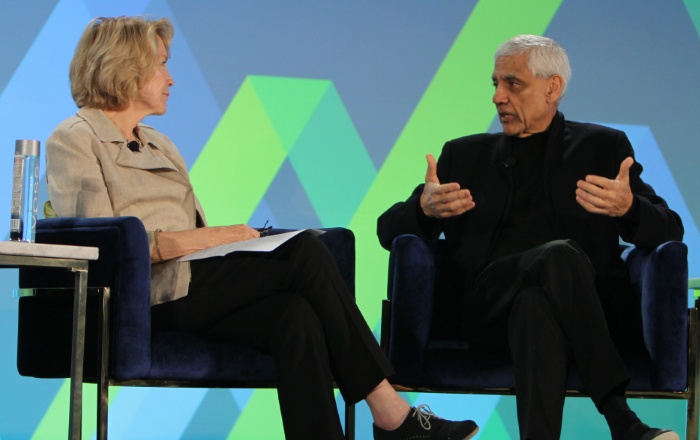Vinod Khosla has not been shy about criticizing the slow pace at which health care has embraced technology. In 2016, he wrote “suboptimal outcomes result from the incomplete knowledge and personal biases of today’s system.” With substantial personal wealth – he was ranked 368 on the Forbes 400 with an estimated wealth of $2.2 billion – Khosla is investing heavily in ventures that are trying to increase the pace at which technology changes health care. Khosla Ventures has funded more than 30 health care startups.
At the Health Evolution Summit, he sat down with Molly Coye, executive in residence AVIA, for “A Perspective: The Great Beyond–Technology + Humans Deliver Health,” a conversation in which he expressed enthusiasm for some of the innovations he sees taking shape.
I believe the only way we dramatically improve quality is to get humans generally out of the loop whenever possible.
Vinod Khosla, Kholsa Ventures
One area where he is especially optimistic is in CMS’s openness to innovation; he believes that the biggest gains from innovation are likely to happen for those who are under-served.
“It will happen on the fringe. It will happen where people aren’t getting care today or not getting adequate care,” he said, “I believe the only way we dramatically improve quality is to get humans generally out of the loop whenever possible.”
His investments include startups in health care analytics, machine learning and improved diagnostics. He believes health care needs to make greater investments in capturing and analyzing biomarkers to predict disease before it occurs.
“It is silly that in 2019, most people who discover they have heart disease discover it by having a heart attack,” he said. “You should know it 10 years in advance when you can do something about it.”
Khosla spoke highly of Albert-Laszlo Barabasi’s work on network medicine as an indication of how applying machine learning to larger pools of biomarkers will lead to predictive models.
He may be more optimistic than in the past but he still does not shy away from sweeping criticisms of the medical establishment. As an example of the impact that improved predictive models could have on clinical practice, he said that $15 billion a year is spent on Humira but half is wasted because no one can predict which patient will benefit and which patient will not.
“We can with very high specificity predict whether Humira will work in a patient or not with a simple upfront diagnostic test,” he said.
As an example of machine learning and network medicine in practice, he described the work being done by one of his portfolio companies, Ginger.io. The startup provides mental health support through a network of therapists and psychiatrists who communicate with patients through text and phone calls. The system employs automated AI conversations, escalating patients to psychiatric nurses and psychiatrists as required.
“This is the way AI systems will be introduced. A patient texts the question to the AI system. The AI system formulates an answer, the next best question, or a clarification, and sends it to the physician, who then sends it to the patient. The physician can modify it and send it, or discard it and send a different question.”
As the volume of interactions grows into the millions, the levels of accuracy improve.
“Every one of those events is a learning system,” he said. “Once you do a million sessions you’ve improved so much, it’s very much like evolutionary biology. The systems evolve very quickly, and that’s how I think most things will be done.”
The next step is to increase the biomarkers available for the learning systems to analyze. He described a similar system developed for patients presenting with cardiovascular symptoms based on millions of ECG records in a learning system
“The patient takes the ECG, dictates their symptoms and now you have contextual data when there is a problem.” A learning system on this scale would rely on taking down the cost of ECGs to where a patient might take 20 ECGs a month. One of Khosla Ventures portfolio companies, AliveCor, has developed FDA-cleared clinical-grade personal ECG monitor which sell for $99.
Khosla once wrote that AI would replace 80 percent of what doctors do. He now believes the health care system will evolve into a system of networked medicine where the need for specialists is reduced.
“If you look at the healthcare system, essentially the hierarchy is the hierarchy of expertise. Your cardiologist is more important than your endocrinologist, who is more important than your primary care physician, who is more important than the nurse, and the patient is at the bottom of the stack. AI will allow an inversion of the stack. Patients will be free to ask any question and get a detailed explanation.”
As a result, he believes that in the primary care physician will become the most important physician.
“They will have systems with the expertise of a cardiologist, an endocrinologist, and a gastroenterologist, and integrate that knowledge and offer it to the patient.
Khosla said he is often asked about how to introduce innovation.
“I suggest the following. Don’t do it in a visible way,” he said. “Don’t have the board of directors look at an innovative program, because as soon as you give innovation high visibility, it becomes subject to measurement, and the rate of change is not predictable. It’s something you have to keep at for a long time, and you apply it in the fringes then introduce it to the center, only after you are sure.”











